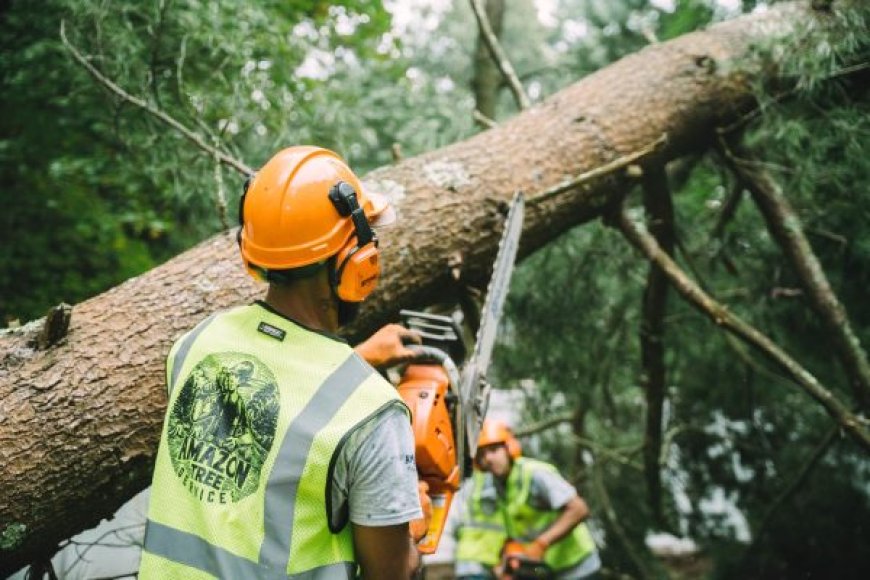The Complete Guide to Tree Removal: When, Why, and How
Tree removal is a serious task with serious consequences if done wrong. Whether it's about safety, space, or style, getting rid of a tree is often the smart move—but only when handled by pros. With the right team, the process is smooth, safe, and even environmentally friendly. If you’ve got a problematic tree, don’t wait until it causes trouble—take action today.

So, youve got a tree thats gotta go? Whether its leaning ominously or just in the way of your dream patio, tree removal can be a game-changer for safety and aesthetics. But its not as simple as grabbing a saw and going to town. Tree removal is a delicate process that requires planning, precision, and sometimesheavy machinery.
? What Is Tree Removal?
Tree removal is the complete cutting down and removal of a tree from its spot, including the trunk, branches, and often the stump. Its typically done by professionals who understand the risks involved and have the right equipment to do the job safely.
?? Why Tree Removal Matters
Removing a tree isnt just about making spaceit can be about preventing danger, protecting property, and making room for healthier landscaping. Done right, its a smart investment in your homes future.
? Common Reasons for Tree Removal
You might be surprised by how many valid reasons there are to say goodbye to a tree.
? Dead or Dying Trees
A tree thats no longer alive is more than just an eyesoreits a ticking time bomb. Dead trees are brittle and can collapse without warning, causing serious damage.
?? Safety Hazards
Overgrown branches near power lines, cracked trunks, or trees leaning toward buildings all spell potential disaster. Removing them is the proactive (and safer) choice.
?? Property Damage Risks
Roots can crack foundations, uplift sidewalks, and even damage plumbing. Sometimes the only fix is complete removal.
? Landscaping and Renovation Plans
Got a backyard makeover in mind? If a tree doesnt fit the new blueprint or blocks sunshine, removal clears the way.
? Pest or Disease Infestation
Some infestations are so severe that removing the tree is the only way to stop the spread to nearby greenery.
? Tree Removal Process Explained
? Site Assessment
A professional will first inspect the tree and surrounding area to determine the best removal strategyespecially if there are buildings, power lines, or fences nearby.
? Planning and Preparation
Next, theyll gather permits (if needed), prepare equipment, and create a safety plan. This step is crucialno one wants a tree falling through their roof!
?? Tree Cutting Techniques
Depending on the trees size and location, experts may climb and section it down or use machinery like cranes to lift parts away safely.
? Debris Cleanup and Disposal
Once the tree is down, the crew will handle cleanup, including limbs, trunk, and sawdust. Some even offer wood chipping or firewood services.
? Types of Tree Removal Services
? Standard Tree Removal
For average-sized trees in accessible areas, standard removal involves cutting the tree in sections and lowering them to the ground.
? Emergency Tree Removal
Storm damage or fallen trees? Emergency services are available 24/7 to handle dangerous situations fast.
?? Crane-Assisted Tree Removal
For large or difficult trees, cranes help lift and maneuver heavy limbs safely.
? Stump Grinding and Removal
After the tree is gone, the stump can be ground down below soil level or dug out entirely.
? Cost of Tree Removal
? What Influences the Price?
-
Tree size and height
-
Tree location and accessibility
-
Condition (dead, infested, or storm-damaged)
-
Local labor rates
-
Need for cranes or emergency service
? Average Cost Estimates
-
Small Tree (under 30 ft): $150$400
-
Medium Tree (3060 ft): $400$800
-
Large Tree (60100+ ft): $900$2,000+
? Tips to Reduce Tree Removal Costs
-
Schedule during off-peak seasons
-
Combine with other landscaping tasks
-
Get multiple quotes
-
Remove multiple trees in one go
???? Hiring a Tree Removal Professional
? Choosing the Right Tree Removal Company
-
Look for ISA-certified arborists
-
Check reviews and references
-
Ask about safety gear and equipment
-
Confirm insurance and licensing
? Questions to Ask Before Hiring
-
Do you provide a written estimate?
-
Is cleanup included?
-
Will you handle permits?
-
Whats the timeline for the job?
? The Importance of Insurance and Certification
Always choose an insured and certified professional. If someone gets hurt or your property is damaged, you want coverage.
? DIY Tree Removal Is It Worth It?
? Pros and Cons of DIY Tree Cutting
Pros:
-
Potentially cheaper
-
Immediate action
Cons:
-
Extremely dangerous
-
Requires expensive tools
-
No insurance protection
-
Risk of improper removal
? Safety Concerns and Equipment Requirements
Chainsaws, ladders, falling limbsDIY tree removal can be a nightmare if youre untrained. One wrong move can mean injury or property damage.
? Legal and Environmental Considerations
? Permits for Tree Removal
Some cities or HOAs require a permit before you cut down certain treesespecially if theyre large or native species.
? Local Regulations and Protected Trees
Removing protected trees without permission can result in hefty fines. Always check local laws before cutting.
?? Eco-Friendly Disposal Options
Many companies recycle removed trees into mulch, firewood, or lumberjust ask!
? What to Do After Tree Removal
? Stump Removal Options
Leaving the stump may lead to regrowth or pest infestation. Choose between grinding (quicker) or full removal (thorough).
? Replanting and Landscaping Ideas
Consider planting a new tree or creating a flower bed where the old one stood. Its a great way to turn loss into growthliterally!
? Conclusion
Tree removal is a serious task with serious consequences if done wrong. Whether it's about safety, space, or style, getting rid of a tree is often the smart movebut only when handled by pros. With the right team, the process is smooth, safe, and even environmentally friendly. If youve got a problematic tree, dont wait until it causes troubletake action today.
?FAQs
1. How do I know if a tree needs to be removed?
Look for signs like dead branches, leaning trunks, fungal growth at the base, or roots damaging structures.
2. Is tree removal covered by insurance?
Only if the tree damages insured property due to a covered peril like a storm. Routine removals are typically out of pocket.
3. How long does it take to remove a tree?
Anywhere from a few hours to a full day, depending on the tree size and complexity.
4. Can I remove a tree myself?
You can, but it's highly risky. Unless its small and isolated, its best left to the pros.
5. What happens to the wood after tree removal?
Many companies offer to chip it into mulch, haul it away, or leave it as firewoodits up to you!







































